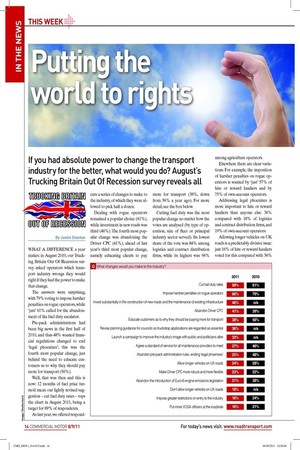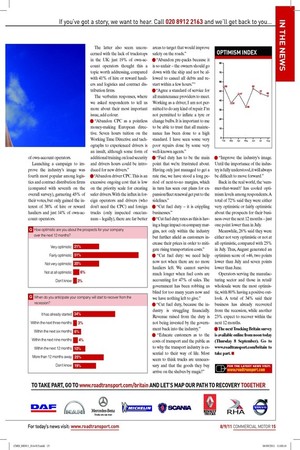Putting the world to rights
Page 10

Page 11

If you've noticed an error in this article please click here to report it so we can fix it.
If you had absolute power to change the transport industry for the better, what would you do? August’s Trucking Britain Out Of Recession survey reveals all
By Justin Stanton
WHAT A DIFFERENCE a year makes: in August 2010, our Trucking Britain Out Of Recession survey asked operators which transport industry wrongs they would right if they had the power to make that change.
The answers were surprising, with 79% voting to impose harsher penalties on rogue operators, while ‘just’ 61% called for the abandonment of the fuel duty escalator.
Pre-pack administrations had been big news in the irst half of 2010, and thus 48% wanted inancial regulations changed to end ‘legal phoenixes’; this was the fourth most popular change, just behind the need to educate customers as to why they should pay more for transport (56%).
Well, that was then and this is now: 12 months of fuel price turmoil mean our lightly revised suggestion – cut fuel duty rates – tops the chart in August 2011, being a target for 89% of respondents.
As last year, we offered respond ents a series of changes to make to the industry, of which they were allowed to pick half a dozen.
Dealing with rogue operators remained a popular choice (61%), while investment in new roads was third (46%). The fourth most popular change was abandoning the Driver CPC (41%), ahead of last year’s third most popular change, namely educating clients to pay more for transport (38%, down from 56% a year ago). For more detail, see the box below.
Cutting fuel duty was the most popular change no matter how the votes are analysed (by type of operation, size of leet or principal industry sector served). Its lowest share of the vote was 84% among logistics and contract distribution irms, while its highest was 96% among agriculture operators.
Elsewhere there are clear variations. For example, the imposition of harsher penalties on rogue operators is wanted by ‘just’ 57% of hire or reward hauliers and by 75% of own-account operators.
Addressing legal phoenixes is more important to hire or reward hauliers than anyone else: 36% compared with 18% of logistics and contract distribution irms, and 19% of own-account operators.
Allowing longer vehicles on UK roads is a predictably divisive issue: just 16% of hire or reward hauliers voted for this compared with 36% of own-account operators.
Launching a campaign to improve the industry’s image was fourth most popular among logistics and contract distribution irms (compared with seventh on the overall survey), garnering 45% of their votes, but only gained the interest of 38% of hire or reward hauliers and just 14% of own-account operators. The latter also seem unconcerned with the lack of truckstops in the UK: just 19% of own-account operators thought this a topic worth addressing, compared with 41% of hire or reward hauliers and logistics and contract distribution irms.
The verbatim responses, where we asked respondents to tell us more about their most important issue, add colour.
• “Abandon CPC as a pointless money-making European directive. Seven hours tuition on the Working Time Directive and tachographs to experienced drivers is an insult, although some form of additional training on load security and drivers hours could be introduced for new drivers.” • “Abandon driver CPC. This is an excessive ongoing cost that is low on the priority scale for creating safer drivers. With the inlux in foreign operators and drivers (who don’t need the CPC) and foreign trucks (only inspected once/annum – legally), there are far better areas to target that would improve safety on the roads.” • “Abandon pre-packs because it is so unfair – the owners should go down with the ship and not be allowed to cancel all debts and restart within a few hours.”" • “Agree a standard of service for all maintenance providers to meet. Working as a driver, I am not permitted to do any kind of repair. I’m not permitted to inlate a tyre or change bulbs. It is important to me to be able to trust that all maintenance has been done to a high standard. I have seen some very poor repairs done by some very well-known agents.” • “Fuel duty has to be the main point that we’re frustrated about. Having only just managed to get a rate rise, we have stood a long period of next-to-no margins, which in turn has seen our plans for expansion/leet renewal get put to the sidelines.” • “Cut fuel duty – it is crippling businesses.” • “Cut fuel duty rates as this is having a huge impact on company margins, not only within the industry but further aield as customers increase their prices in order to mitigate rising transportation costs.” • “Cut fuel duty: we need help now not when there are no more hauliers left. We cannot survive much longer when fuel costs are accounting for 47% of sales. The government has been robbing us blind for too many years now and we have nothing left to give.” • “Cut fuel duty, because the industry is struggling inancially. Revenue raised from the duty is not being invested by the government back into the industry.” • “Educate customers as to the costs of transport and the public as to why the transport industry is essential to their way of life. Most seem to think trucks are unnecessary and that the goods they buy arrive on the shelves by magic!” • “Improve the industry’s image. Until the importance of the industry is fully understood, it will always be dificult to move forward.” Back in the real world, the ‘summer-that-wasn’t’ has cooled optimism levels among respondents. A total of 72% said they were either very optimistic or fairly optimistic about the prospects for their business over the next 12 months – just one point lower than in July.
Meanwhile, 26% said they were either not very optimistic or not at all optimistic, compared with 25% in July. Thus, August generated an optimism score of +46, two points lower than July and seven points lower than June.
Operators serving the manufacturing sector and those in retail/ wholesale were the most optimistic, with 80% having a positive outlook. A total of 34% said their business has already recovered from the recession, while another 23% expect to recover within the next 12 months.
• The next Trucking Britain survey is available online from noon today (Thursday 8 September). Go to www.roadtransport.com/britain to take part. ■












































